|
|
|
Sort Order |
|
|
|
Items / Page
|
|
|
|
|
|
|
| Srl | Item |
| 1 |
ID:
127576
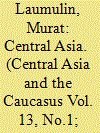

|
|
|
|
|
| Publication |
2012.
|
| Summary/Abstract |
In Central Asia, religion is gradually coming to the fore in everyday life as a fairly integrated phenomenon with a wide range of functions: consolidation of ethnic self-awareness, shaping spiritual and moral culture together with the awareness of being part of a religious and the world community; fulfilling social functions through religious prescriptions; formulating the ideals of social justice, as well as man's duty to the state and the state's to man, etc.
Some of the functions, however, are internally contradictory: consolidation of the religious community does not always bring society together. In other words, in some cases religion might exacerbate the relations between the state and the religious part of society.
Religious consolidation not infrequently revives old problems and breeds disagreements inside society; conscientious believers often make too rigid demands of the state (which turns them into the opposition), while any encroachments on the religious principle of fairness may stir up protest feelings.
|
|
|
|
|
|
|
|
|
|
|
|
|
|
|
|
| 2 |
ID:
129273
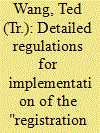

|
|
|
|
|
| Publication |
2012.
|
| Summary/Abstract |
The article offers information regarding the Chinese regulations on Chinese Muslims traveling abroad on Hajj pilgrimages. It mentions that the applicants for Hajj pilgrimages should comply with the conditions including the Chinese citizen should be greater than 18 years of age and believe in Islam religion, the citizen should be physically healthy, and should possess funds adequate for the pilgrimage.
|
|
|
|
|
|
|
|
|
|
|
|
|
|
|
|
| 3 |
ID:
129274
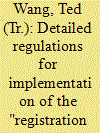

|
|
|
|
|
| Publication |
2012.
|
| Summary/Abstract |
The article offers information regarding the Chinese regulations on Chinese Muslims traveling abroad on Hajj pilgrimages. It mentions that the applicants for Hajj pilgrimages should comply with the conditions including the Chinese citizen should be greater than 18 years of age and believe in Islam religion, the citizen should be physically healthy, and should possess funds adequate for the pilgrimage.
|
|
|
|
|
|
|
|
|
|
|
|
|
|
|
|
| 4 |
ID:
130940
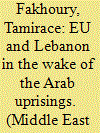

|
|
|
|
|
| Publication |
2014.
|
| Summary/Abstract |
Lebanon is a multisectarian state in which Muslim and Christian groups share political power. The executive elite is composed of a Maronite president, a Shiite speaker of parliament and a Sunni prime minister. The legislature is split 50-50 between Muslims and Christians, and communities enjoy educational and religious autonomy. Two pacts act as regulatory frameworks for these political arrangements: the 1943 National Pact and the 1989 Taif agreement, which put a halt to Lebanon's 15-year civil war (1975-90).
While Lebanon's prewar political system (1943-75) was often framed as a paradigmatic case of consociational or power-sharing democracy,1 most observers today agree that this system is an anarchistic model for the devolution of power. 2 Sectarian3 politics feeds on patronage ties and foreign alliances through which communities vie for control over resources. It further reifies partisanship in external conflicts.
|
|
|
|
|
|
|
|
|
|
|
|
|
|
|
|
| 5 |
ID:
130935
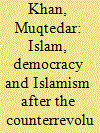

|
|
|
|
|
| Publication |
2014.
|
| Summary/Abstract |
The overthrow of the Muslim Brotherhood's presidency in Egypt by an unprecedented partnership between the army and Tamarod ("rebellion" in Arabic), a grassroots opposition movement, followed by the brutal repression of the Brotherhood, has left observers dazed and puzzled. The speed and savageness with which democracy, and perhaps even the hope for democracy, has been smashed in Egypt was unexpected and harrowing to watch. This episode may cast a long shadow on how Egyptian and regional polities negotiate with endemic authoritarianism.1 It will also have a profound impact on how political Islam, especially in the Arab world, evolves. Some commentators are forecasting the end of political Islam;2 others have limited their obituaries to the Muslim Brotherhood in Egypt.3 Some opine that perhaps the Muslim world is not ready for democracy; others claim the contention that Islam and democracy are not compatible has been vindicated
|
|
|
|
|
|
|
|
|
|
|
|
|
|
|
|
| 6 |
ID:
105669
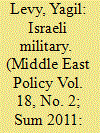

|
|
|
| 7 |
ID:
129011
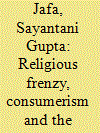

|
|
|
| 8 |
ID:
131476
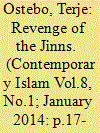

|
|
|
|
|
| Publication |
2014.
|
| Summary/Abstract |
The point of departure for this article is a story about jinns taking revenge upon people who have abandoned earlier religious practices. It is a powerful account of their attempt to free themselves from a past viewed as inhabited by evil forces and about the encounter between contemporary Salafi reformism and a presumed disappearing religious universe. It serves to prove how a novel version of Islam has superseded former practices; delegitimized and categorized as belonging to the past. The story is, however, also an important source and an interesting entry-point to examine the continued relevance of past practices within processes of reform. Analyzing the story about the jinns and the trajectory of Salafi reform in Bale, this contribution demonstrates how the past remains intersected with present reformism, and how both former practices and novel impetuses are reconfigured through this process. The article pays attention to the dialectics of negotiations inherent to processes of reform and points to the manner in which the involvement of a range of different actors produces idiosyncratic results. It challenges notions of contemporary Islamic reform as something linear and fixed and argues that such processes are multifaceted and open-ended.
|
|
|
|
|
|
|
|
|
|
|
|
|
|
|
|
| 9 |
ID:
132967
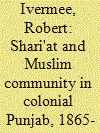

|
|
|
|
|
| Publication |
2014.
|
| Summary/Abstract |
This paper argues that concerns for the government appointment of qazis, officers for the administration of Muslim law, and the greater application of shari'at critically shaped Muslim community formation in later nineteenth century Punjab. Between 1865 and 1885, Punjabi Muslim elites attested the necessity of qazis being appointed by government and Muslim law being administered in the colonial judicial system. With the support of Gottlieb Leitner, registrar of the Punjab University College, Muslim parties used the emergent associations of Punjab civil society, including the Anjuman-i-Punjab (Lahore) and Anjuman-i-Islam (Lahore), to assert the indispensability of religious law. In doing so, they challenged the Anglo-Indian decision to prioritize customary law in the Punjab and advanced the religious group as the basic social unit of Punjab society. In Punjab public spaces, the relevance of Islam was proclaimed, challenging the professed Anglo-Indian distinction between private and public, religious and secular spheres. However, demands for qazi appointment and the administration of shari'at problematize well-rehearsed arguments about the relationships between family, community, state and religion in colonial Punjab. Only through an enquiry into the two decades after 1865 may later political campaigns for the application of shari'at be understood.
|
|
|
|
|
|
|
|
|
|
|
|
|
|
|
|
| 10 |
ID:
128147
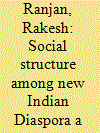

|
|
|
|
|
| Publication |
2014.
|
| Summary/Abstract |
A diaspora exists precisely because it remembers the 'homeland' without this memory this migrants and settlers would be simply people in a new setting, into which they merge, bringing little or nothing to the new home, accepting in various way and forms the mores and attitudes that already exists in their new country and society … The people of the Diaspora, however do not merely settle in new countries: they recreate in their socio-economic, political and cultural institutions a version of that homeland that they remember. (Reeves and Rai 2006: 17).
|
|
|
|
|
|
|
|
|
|
|
|
|
|
|
|
| 11 |
ID:
132272
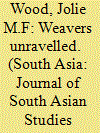

|
|
|
|
|
| Publication |
2014.
|
| Summary/Abstract |
A comparative study of mobilisation by two lower-class occupational groups in Varanasi, India, presents a puzzle: one group, the boatmen of the Mallah community, have successfully formed and sustained several associations to promote boatmen's occupational interests, whereas another group, the handloom weavers of the Ansari community, have no self-formed, durable, active associations. This paper argues that transformation and decline of the weaving industry and significant class divisions within a community that continues to be highly marginalised have left the handloom weavers particularly vulnerable and pose steep challenges to self-organisation.
|
|
|
|
|
|
|
|
|
|
|
|
|
|
|
|
| 12 |
ID:
129272
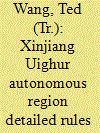

|
|
|
|
|
| Publication |
2012.
|
| Summary/Abstract |
These "Detailed Rules for Implementation of the 'Registration and Queuing Regulations for Chinese Muslims Traveling Abroad on Hajj Pilgrimages(Provisional)'" are enacted in accordance with the "Registration and Queuing Regulations for Chinese Muslims Traveling Abroad on Hajj Pilgrimages (Provisional)"and in connection with the actualities in Xinjiang with a view to regulating this region's Hajj pilgrimage registration and queuing work
|
|
|
|
|
|
|
|
|
|
|
|
|
|
|
|
|
|
|
|
|